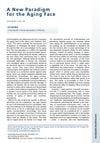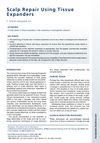 18 citations,
March 2014 in “Current Pharmaceutical Biotechnology”
18 citations,
March 2014 in “Current Pharmaceutical Biotechnology” Metformin helps regulate menstrual cycles, induce ovulation, and improve pregnancy outcomes in women with PCOS.
 38 citations,
January 2014 in “International Journal of Endocrinology”
38 citations,
January 2014 in “International Journal of Endocrinology” Adrenal disorders can cause lasting brain and behavior issues in children.
 February 2012 in “InTech eBooks”
February 2012 in “InTech eBooks” PCOS increases the risk of heart disease and type 2 diabetes in women.
[object Object]  1 citations,
August 2018 in “bioRxiv (Cold Spring Harbor Laboratory)”
1 citations,
August 2018 in “bioRxiv (Cold Spring Harbor Laboratory)” A new mutation in the TMEM173 gene and a risk allele in IFIH1 cause a unique set of immune-related symptoms.
 16 citations,
July 2007 in “Facial Plastic Surgery Clinics of North America”
16 citations,
July 2007 in “Facial Plastic Surgery Clinics of North America” The document suggests using fat grafting and laser therapy to improve the aging Asian face and hair restoration techniques tailored to Asian hair characteristics, emphasizing natural results and cultural sensitivity.
 7 citations,
August 1989 in “The Journal of Dermatologic Surgery and Oncology”
7 citations,
August 1989 in “The Journal of Dermatologic Surgery and Oncology” Facelifts can lead to high patient satisfaction and a quick recovery when done correctly.
 10 citations,
April 2018 in “Facial Plastic Surgery”
10 citations,
April 2018 in “Facial Plastic Surgery” The surgical technique of scalp advancement and pretrichial brow lift shortens the forehead and lifts brows, is good for women and transgender women with high foreheads, but not recommended for men and has some risks.
[object Object]  3 citations,
October 1988 in “Clinics in Dermatology”
3 citations,
October 1988 in “Clinics in Dermatology” Using 3% topical minoxidil can help women with hair loss, but more research is needed.
 25 citations,
November 2005 in “Facial Plastic Surgery”
25 citations,
November 2005 in “Facial Plastic Surgery” The article concludes that surgeons should tailor facial surgery techniques for Asian males to their unique cultural and anatomical needs.
 14 citations,
November 2015 in “Annals of the New York Academy of Sciences”
14 citations,
November 2015 in “Annals of the New York Academy of Sciences” Changing the diet of mice lacking the enzyme CBS can affect symptoms related to the genetic condition.
 4 citations,
August 2018 in “Facial Plastic Surgery Clinics of North America”
4 citations,
August 2018 in “Facial Plastic Surgery Clinics of North America” Platelet-Rich Plasma (PRP), a protein-rich extract from a patient's blood, shows promise in improving hair density, thickness, and quality, but the best method of use and number of treatments needed for noticeable results are still unclear.
 16 citations,
February 2010 in “Facial Plastic Surgery Clinics of North America”
16 citations,
February 2010 in “Facial Plastic Surgery Clinics of North America” Dr. Samuel M. Lam's article concludes that skilled facial fat grafting can effectively restore facial volume and serve as a complement or alternative to traditional face-lifting methods.
 May 1999 in “Journal of Oral and Maxillofacial Surgery”
May 1999 in “Journal of Oral and Maxillofacial Surgery” The book provides practical guidance on cosmetic facial surgery for clinicians.
 34 citations,
December 2012 in “Indian Journal of Dermatology, Venereology and Leprology”
34 citations,
December 2012 in “Indian Journal of Dermatology, Venereology and Leprology” Mesotherapy shows promise for cellulite and facial rejuvenation but has mixed results for body sculpting and hair loss, with more research needed for safety and effectiveness.
3 citations,
May 2021 in “PloS one” Many men misuse oral contraceptive pills for things like hair growth and muscle gain.
 1 citations,
February 2023 in “Journal of cosmetic dermatology”
1 citations,
February 2023 in “Journal of cosmetic dermatology” PRP use in skin care and plastic surgery is growing, especially in the U.S. and Italy.
 January 2012 in “Elsevier eBooks”
January 2012 in “Elsevier eBooks” Hair transplantation is highly effective with careful technique and attention to patient needs.
 11 citations,
August 2013 in “Facial Plastic Surgery Clinics of North America”
11 citations,
August 2013 in “Facial Plastic Surgery Clinics of North America” Tissue expanders effectively repair large scalp defects and restore a natural-looking scalp.
 12 citations,
January 1978 in “The Laryngoscope”
12 citations,
January 1978 in “The Laryngoscope” Using a scalp flap for hair transplantation gives denser, faster results than older methods, but it's complex and needs careful planning.
 January 2022 in “Function”
January 2022 in “Function” Studying rare genetic disorders can help us understand and treat common diseases better.
 1 citations,
August 2023 in “The journal of pharmacology and experimental therapeutics/The Journal of pharmacology and experimental therapeutics”
1 citations,
August 2023 in “The journal of pharmacology and experimental therapeutics/The Journal of pharmacology and experimental therapeutics” Kir6.1 mutations in Cantú syndrome increase channel sensitivity and hyperpolarization, while SUR2B mutations do not.
 124 citations,
October 2019 in “Frontiers in Immunology”
124 citations,
October 2019 in “Frontiers in Immunology” Janus kinase inhibitors are promising treatments for autoimmune skin diseases like eczema and psoriasis.
 1 citations,
April 2019 in “Aesthetic Plastic Surgery”
1 citations,
April 2019 in “Aesthetic Plastic Surgery” Secondary hairline correction surgery can be effective and satisfying when customized to the patient's needs.
 November 2013 in “Dermatologic Clinics”
November 2013 in “Dermatologic Clinics” The document summarizes the latest trends and advancements in cosmetic dermatology.
 January 2023 in “Laryngoscope”
January 2023 in “Laryngoscope” Platelet-rich plasma (PRP) can help restore hair, but the best method for preparing and using it is still unclear.

Hair loss after weight loss surgery can improve over time.
 December 1989 in “The Journal of Dermatologic Surgery and Oncology”
December 1989 in “The Journal of Dermatologic Surgery and Oncology” New techniques and findings in dermatologic surgery show improved pain management, safer liposuction, better hair transplantation, and effective treatments for skin conditions.
 3 citations,
April 2011 in “Expert Review of Dermatology”
3 citations,
April 2011 in “Expert Review of Dermatology” Mesotherapy lacks strong evidence for effectiveness and safety, and its ingredients are not FDA-approved for subcutaneous use.
 6 citations,
July 2018 in “JAMA facial plastic surgery”
6 citations,
July 2018 in “JAMA facial plastic surgery” Injecting minced fat into the facial artery can cause severe eye problems and death, more so than other fat types, and larger amounts increase these risks.
 2 citations,
March 2017 in “Archives of Plastic Surgery”
2 citations,
March 2017 in “Archives of Plastic Surgery” Intense pulsed light is a safe and effective way to thin hair for East Asians after hairline surgery.





























